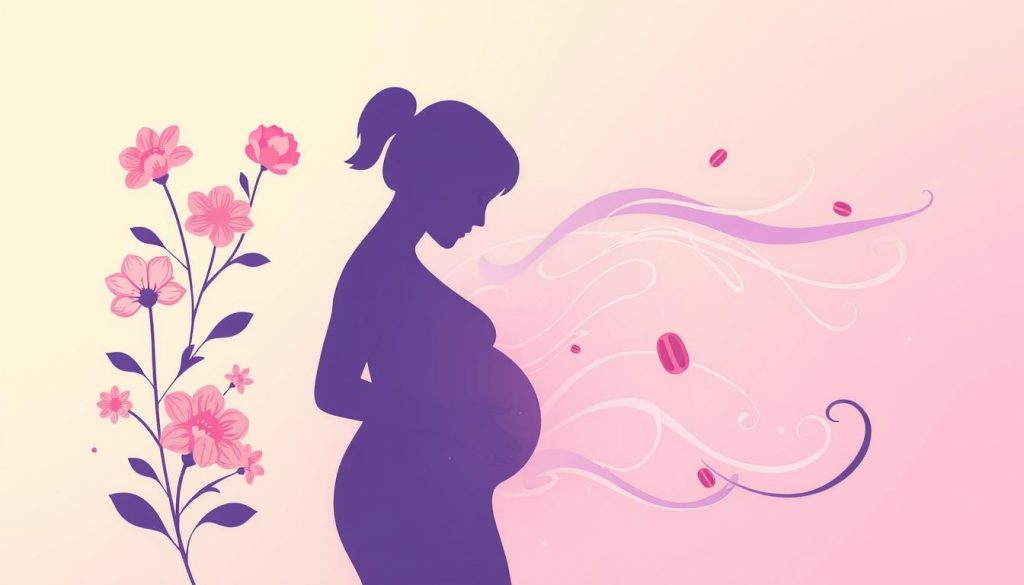As you journey through the joys and challenges of pregnancy, the second trimester brings unique experiences. Managing pregnancy tiredness is a big part of it. This section will explore ways to fight fatigue in the second trimester.
Rest assured, you’re not alone in this experience. Many women face energy lows during pregnancy. With the right approaches, you can boost your energy and enjoy these months more.
We’ll look at nutrition, exercise, hydration, and lifestyle changes to help you. These strategies will guide you to a more comfortable and energized pregnancy.
Understanding Pregnancy Tiredness in the Second Trimester
As pregnancy moves into the second trimester, many moms-to-be feel more tired. This time, with big physiological changes during pregnancy, makes fatigue worse. Knowing these changes can help manage and lessen second trimester fatigue.
Physiological Changes Leading to Increased Fatigue
In the second trimester, the body changes a lot, leading to more tiredness. A big increase in blood volume is needed for the growing baby but can tire the mom. Hormonal shifts, like more progesterone, also make moms feel more tired.

Common Triggers of Second Trimester Tiredness
Many things can make second trimester fatigue worse. These include:
- Increased emotional stress as the reality of impending motherhood sets in.
- Physical changes leading to discomfort and disrupted sleep, such as back pain and frequent urination.
- Nutritional demands escalate as the fetus grows, which can deplete the mother’s energy reserves if not managed with a balanced diet.
Knowing what causes tiredness is key to managing it. It helps keep both the mom and the baby healthy during this important time.
Managing Pregnancy Tiredness with Nutrition
Nutrition is key when fighting pregnancy tiredness. Eating right helps keep energy up during this important time. By planning meals well, soon-to-be moms can avoid feeling tired by eating foods full of good nutrients.
Essential Nutrients for Energy During Pregnancy
Some nutrients are super important for energy. Iron helps prevent anemia, which can make you feel really tired. Vitamin B12, D, omega-3 fatty acids, and magnesium also boost energy.

Recommended Dietary Adjustments and Meal Planning
Good meal planning is more than just changing your diet sometimes. It’s about making sure you get all the nutrients you need every day. Here’s a weekly meal plan that fights fatigue with all the right foods.
| Day | Breakfast | Lunch | Dinner | Snacks |
|---|---|---|---|---|
| Monday | Oatmeal with berries | Grilled chicken salad | Lentil soup with spinach | Greek yogurt and honey |
| Tuesday | Spinach and feta cheese omelette | Quinoa and vegetable stir-fry | Baked salmon with asparagus | Raw nuts and sliced apples |
| Wednesday | Whole grain toast with avocado | Turkey and cheese wrap | Stuffed bell peppers | Cottage cheese with pineapple |
| Thursday | Yogurt parfait with granola | Beef stew with whole grain bread | Chicken and vegetable pasta | Carrot sticks with hummus |
| Friday | Smoothie with spinach, banana, and peanut butter | Lentil salad with tomatoes and feta | Trout with quinoa and broccoli | Almonds and dried cranberries |
| Saturday | Scrambled eggs and mushrooms | Pita sandwich with avocado and sprouts | Baked tofu with stir-fried veggies | Mixed berries and walnuts |
| Sunday | French toast with strawberries | Chicken Caesar salad | Shrimp paella | Pumpkin seeds and slices of mango |
This meal plan helps fight pregnancy tiredness with balanced meals. It also makes grocery shopping and cooking easier. With good nutrition and meal planning, managing fatigue is easier, making pregnancy healthier and more comfortable.
Hydration: A Key to Fighting Second Trimester Fatigue
In the pregnancy tiredness second trimester, staying hydrated is key. Many moms-to-be feel more tired during this time. Drinking enough water can help fight fatigue and keep you healthy.
Dehydration can make you feel really tired. It’s important for pregnant women to drink lots of water. Water helps move nutrients and hormones around your body, giving you energy. Without enough water, your body works less well, and you feel more tired.
- Start the day with a glass of water to activate the internal organs.
- Carry a reusable water bottle to ensure hydration throughout the day.
- Incorporate hydrating foods into your diet such as cucumbers, strawberries, and watermelon which contain significant amounts of water.
It’s not just how much you drink that matters, but what you drink too. Drinks with caffeine might help you feel awake but can also dry you out. Try water, coconut water, or herbal teas instead to keep your energy up during the pregnancy tiredness second trimester.
Drinking enough water can also lower the chance of getting a urinary tract infection. These infections are common in pregnancy and can make you feel even more tired. Plus, staying hydrated helps keep the right amount of fluid around your baby, which is good for their health.
Remembering to drink water is not just about fighting tiredness. It’s also important for your health and your baby’s health during pregnancy.
The Role of Exercise in Combating Pregnancy Tiredness Second Trimester
Regular exercise during pregnancy helps fight fatigue in the second trimester. It boosts physical and mental health. We’ll look at how safe pregnancy workouts can increase energy and the benefits of exercise for pregnant women.
Safe Workout Options for Expectant Mothers
It’s key to pick safe exercises for mom and baby. Here are some good choices:
- Walking — a gentle way to maintain fitness without straining your body
- Prenatal Yoga — enhances flexibility, focuses on breathing and relaxation
- Swimming and water aerobics — great for cardio with minimal joint stress
- Stationary cycling — safe for low-impact cardiovascular health
- Strength training using light weights — strengthens muscles and joints
How Regular Activity Boosts Energy Levels
Regular exercise boosts heart health, leading to more energy. Studies show exercise during pregnancy cuts down on tiredness. It also makes labors shorter and easier.
Exercise also improves mood and sleep, fighting tiredness. But, always talk to your doctor before starting any new workout. They can help adjust the intensity and frequency to fit your needs.
Maximizing Sleep Quality for Pregnancy Fatigue Relief
Getting good sleep is key for both mom-to-be and baby. Good sleep habits can boost health and reduce tiredness. We’ll look at how to make your sleep space cozy and adopt habits for better sleep.
Creating a Restful Sleep Environment
The right sleep area is essential. Soft lights, quiet, and cool air create a peaceful space. Use supportive pillows and a firm mattress for comfort. Keep phones and computers out of the bedroom to avoid blue light and other distractions.
Effective Sleep Routines for Pregnant Women
Having a regular sleep schedule is very helpful. Going to bed and waking up at the same time every day helps your body get better sleep. Bedtime rituals like reading or a warm bath can also help you relax.
- Set a consistent bedtime and wake-time even on weekends.
- Engage in a relaxing activity before bed, like reading or listening to soft music.
- Limit fluid intake and avoid heavy meals close to bedtime.
- Maintain a comfortable bedroom environment: cool, dark, and quiet.
- Use a pregnancy pillow to improve comfort and support different sleeping positions.
| Activity | Benefit |
|---|---|
| Consistent Sleep Schedule | Helps to regulate the body’s sleep-wake cycle, improving sleep quality. |
| Relaxation Techniques | Reduces stress and anxiety, making it easier to fall asleep. |
| Avoiding Stimulants | Prevents disturbances in sleep onset and quality. |
Remember, the goal is to improve sleep during pregnancy by adapting your environment and habits to support rest.
Strategic Rest and Breaks Throughout the Day
In the second trimester, managing energy is key for pregnant women. Adding strategic rest for pregnant women to daily life can help a lot. This part talks about how to mix rest and breaks to stay energized and fight off tiredness.
Knowing when to take a break and doing it can boost both body and mind. Short breaks cut down on hard work and give your mind a break. This is super important for keeping energy up all day.
- Planning Ahead: Setting aside times for rest helps keep a steady routine.
- Quality over Quantity: It’s better to focus on rest quality. Even a 15-minute break can refresh you if you’re quiet and free from distractions.
- Right Environment: A peaceful spot for rest helps you relax and recharge faster.
- Mindful Breathing: Using mindful breathing during breaks can make you relax even more.
By making strategic rest for pregnant women a priority, expectant mothers can better manage their energy. This improves their health and helps them deal with tiredness in the second trimester.
Addressing Emotional Health to Alleviate Tiredness During Pregnancy Second Trimester
Keeping your emotional health during pregnancy in check is key to beating tiredness. We’ll look at ways to manage stress and the importance of emotional support.
Stress Management Techniques
Stress can make you feel really tired. It’s important for pregnant women to find ways to lower stress. Mindful meditation, controlled breathing, and gentle yoga are great options.
These activities not only reduce stress but also boost your emotional health during pregnancy. Adding relaxation routines to your daily life can help manage stress better. Doing these activities at the same time every day can make them more effective.
The Importance of Emotional Support and Communication
A strong support system can help with both emotional and physical tiredness. Talking to your partner, family, or friends about how you’re feeling can really help. Joining support groups or getting professional help can offer extra support.
For more on keeping relationships strong, check out this guide here. Also, talking to your healthcare provider regularly is important. They can offer reassurance and advice on handling pregnancy challenges.
Prenatal Yoga and Meditation for Energy and Wellness
Doing prenatal yoga and trying meditation during pregnancy can really boost a mom’s energy and health. These activities help manage the body and mind changes in the second trimester. They offer a complete way to handle these changes.
Prenatal yoga is made for pregnant women. It includes poses that make you more flexible, reduce pain, and boost blood flow. These poses also help make your muscles stronger for when it’s time to give birth. Adding meditation to your routine can make these benefits even stronger. It helps your mental health and lowers stress.
- Increased energy and reduced fatigue
- Enhanced sleep quality
- Lowered stress and anxiety levels
- Improved digestion and reduced back pain
- Deeper connection with the baby
Combining prenatal yoga and meditation does more than just keep you physically fit. It also helps you feel calm and open-minded. This is good for both you and your baby.
How to Beat Pregnancy Tiredness with Time Management
To manage time during pregnancy well, you need smart strategies. These should boost your daily productivity and save energy. By setting realistic goals and using energy-saving methods, pregnant women can fight fatigue and stay well. Here, we explore ways to sort tasks and add energy-saving routines to your daily life.
Prioritizing Tasks and Setting Realistic Expectations
When you’re pregnant, it’s key to focus on what’s most important. Start by picking the tasks that need your most energy and attention. Put off or share less urgent tasks to avoid too much stress. Discover how to prioritize tasks and keep your energy up.
- Make a list of urgent tasks.
- Set achievable goals for each day based on your energy.
- Ask family or friends to help with non-essential tasks.
Implementing Energy-Saving Approaches
It’s important to save energy during pregnancy. Work on making your workflow better and take breaks to recharge. Using time blocking and mindfulness can help keep your energy high.
| Time-Saving Technique | Benefit |
|---|---|
| Time Blocking | Helps you focus on tasks without getting tired |
| Mindfulness and Relaxation | Less stress means more energy all day |
| Strategic Breaks | Keeps you from getting too tired |
Using these strategies helps with time management during pregnancy. It also means you set realistic goals for each day. By focusing on what’s most important and saving energy on less critical tasks, you can balance pregnancy with your life and work.
Medical Consultation for Persistent Second Trimester Fatigue
If you’re feeling very tired in your second trimester, it’s important to get professional advice for pregnancy tiredness. Feeling very tired could mean there’s a health issue. Knowing when to see a doctor is key to staying healthy and keeping your baby safe.
Here are some signs you should talk to your healthcare provider about feeling tired:
- Fatigue that suddenly gets worse or doesn’t get better with rest
- Feeling dizzy, having a fast heart rate, or trouble breathing
- Feeling tired and noticing less movement from your baby
- Worries about not drinking enough water or eating well enough
At a medical consultation, you’ll talk about your symptoms, health history, and lifestyle. This helps doctors understand why you’re tired. Here’s what you might discuss and what tests you might have:
| Discussion Topic | Possible Tests |
|---|---|
| Review of symptoms and medical history | Blood tests to check for anemia or thyroid issues |
| Diet and hydration status | Nutritional assessments |
| Psychological well-being | Screenings for depression or anxiety |
| Physical examination | Tests to rule out infections or other common issues |
Talking about these topics with your doctor can help find out why you’re tired. It’s a chance to find ways to feel better. Always ask for professional advice for pregnancy tiredness when you need it.
Herbal Supplements and Natural Remedies: Are They Safe?
Expectant mothers often look for herbal supplements for pregnancy and natural remedies for pregnancy fatigue. They want to stay safe while feeling better. But, it’s key to check if these options are really safe and work well.
Many herbal supplements and natural remedies claim to help with pregnancy symptoms. But, not all have been fully tested for safety during pregnancy. So, talking to a doctor is a must.
- Ginger: Widely recognized for its effectiveness in combating morning sickness and safe for pregnancy.
- Peppermint: Often used to relieve nausea and digestive issues; usually considered safe in moderate amounts.
- Chamomile: Popular for its calming effects, yet pregnant women should limit its usage due to possible contraindications.
Before trying any herbal supplements, pregnant women should talk to their healthcare provider. This ensures they are safe and right for their health and pregnancy.
It’s also important to buy supplements from trusted sources. This helps avoid harmful products. Look for brands that are open about their ingredients and have safety certifications.
In conclusion, natural remedies for pregnancy fatigue and herbal supplements for pregnancy can be good. But, they should not replace regular prenatal care. Always put pregnancy safety first by following doctor-approved treatments and advice.
Coping with Tiredness in Second Trimester by Staying Hydrated
Dealing with pregnancy fatigue can be tough. But, using good hydration tips during pregnancy is key to keeping energy up and staying healthy. Drinking enough water helps control body temperature, aids digestion, and moves nutrients around, all important in the second trimester.
Water is very important when you’re pregnant. It helps make the fluid around your baby, increases blood, builds new tissues, carries nutrients, helps digestion, and removes waste and toxins. Drinking enough water is a big part of fighting off daily pregnancy tiredness.
- Start your day by drinking a glass of water first thing in the morning to kickstart hydration.
- Keep a water bottle handy at all times as a reminder to drink regularly.
- Include water-rich fruits and vegetables in your diet, such as watermelon, strawberries, cucumber, and lettuce.
- Avoid or reduce intake of caffeine and sugary drinks, as these can lead to increased dehydration.
While staying hydrated is a simple strategy, it packs a powerful punch in battling fatigue during pregnancy.
| Hydration Source | Benefits |
|---|---|
| Water | Helps increase energy and relieve fatigue, supports essential bodily functions |
| Water-Rich Foods | Provides hydration and essential nutrients, aids in digestion |
| Decaffeinated Herbal Teas | Offers a soothing alternative to water, can be enjoyed warm or cold |
By adding these hydration tips to your routine, you can better handle your body’s needs and your baby’s health. This helps you fight off pregnancy fatigue more effectively.
Tips for Dealing with Second Trimester Tiredness at Work
As you move into the second trimester, work can get harder because of more tiredness. Making your work space better and changing your habits is key. This helps you stay productive and healthy. Talking to your boss about work changes can really help.
Adjusting Workloads and Schedule Modifications
Changing your work and schedule can help a lot. Talk to your boss about doing less or working different hours. Smaller tasks can stop you from getting too tired and make you work better.
Using Ergonomic Furniture and Taking Frequent Breaks
Getting ergonomic furniture made for pregnant women can make work easier. Things like adjustable chairs and standing desks are good. Also, taking short breaks often is important. It helps prevent swelling and keeps you from getting too tired.
| Ergonomic Item | Benefits | Usage Tips |
|---|---|---|
| Adjustable Desk Chair | Supports back and hips, adjustable for comfort | Adjust height so that feet rest flat on floor, lower back is supported |
| Standing Desk | Reduces lower back pressure, enhances circulation | Alternate between sitting and standing every hour |
| Footrest | Decreases leg swelling, improves posture | Keep feet elevated to reduce swelling |
Pregnancy Fatigue Relief Strategies for a More Energetic Second Trimester
Pregnancy is a time of joy and excitement, but it can also be tiring, mainly in the second trimester. To stay energetic, it’s important to use smart strategies. Eating foods rich in iron and complex carbs helps keep energy up. Drinking plenty of water is also key, as your body needs more fluids to support your growing baby.
Adding some exercise to your day can really help. Try walking, swimming, or prenatal yoga to improve your mood and sleep. Taking short breaks and naps can also boost your energy. Adjusting your work schedule can reduce stress and prevent exhaustion. A good night’s sleep and a regular bedtime routine are essential for feeling refreshed.
These tips are not just suggestions but important steps for pregnant women. By focusing on nutrition, staying hydrated, and balancing activity and rest, you can handle the second trimester better. Always talk to your doctor before trying new things during pregnancy. But with these tips, you can stay full of energy and enjoy this special time.
FAQ
Q: Why do some women experience increased tiredness during the second trimester of pregnancy?
A: Increased tiredness in the second trimester comes from many changes. These include a rise in blood volume and hormonal shifts. Also, the growing fetus adds to the demands on the body.
Q: What kind of diet modifications can help manage second trimester fatigue?
A: Eating a balanced diet with iron, protein, and complex carbs helps keep energy up. Eating smaller meals often and staying hydrated also helps fight tiredness.
Q: How does staying hydrated combat second trimester fatigue?
A: Drinking enough water is key to staying energized. It helps with blood flow, nutrient transport, and prevents dehydration. Dehydration is a common cause of fatigue in pregnancy.
Q: What are some safe exercise options for pregnant women to help reduce tiredness?
A: Safe exercises include walking, swimming, prenatal yoga, and low-impact aerobics. Always talk to your healthcare provider before starting any new exercise.
Q: How can improving sleep aid in reducing tiredness during the second trimester?
A: Better sleep comes from a restful sleep area, a regular sleep schedule, and good sleep habits. These can help fight pregnancy fatigue.
Q: Are short rests throughout the day beneficial for managing pregnancy tiredness?
A: Yes, short breaks during the day can refresh your energy. They help reduce tiredness in the second trimester.
Q: What stress management techniques can help alleviate second trimester tiredness?
A: Stress-reducing methods include deep breathing, prenatal meditation, gentle exercise, and emotional support. These can help manage stress and fatigue.
Q: Can prenatal yoga and meditation increase overall energy levels?
A: Yes, prenatal yoga and meditation can boost energy and lower stress. They contribute to a better sense of well-being, which can help fight tiredness.
Q: How does time management contribute to reducing pregnancy tiredness?
A: Good time management helps prioritize tasks and set realistic goals. It also finds ways to save energy, reducing fatigue in the second trimester.
Q: When should one consult a healthcare provider about persistent fatigue during the second trimester?
A: If fatigue doesn’t get better with rest or lifestyle changes, talk to your healthcare provider. It could mean there’s a medical issue.
Q: Are herbal supplements and natural remedies safe for managing tiredness during pregnancy?
A: Not all herbal supplements and natural remedies are safe during pregnancy. Always check with a healthcare professional before using them to ensure safety for both mother and fetus.
Q: What hydration tips can help cope with tiredness in the second trimester?
A: Drinking lots of water, avoiding caffeine, and eating hydrating foods like fruits and veggies are good tips. They help manage tiredness.
Q: Can certain workplace adjustments help manage second trimester tiredness?
A: Yes, talking about workload changes, using ergonomic furniture, and taking breaks can help. They can reduce fatigue at work.
Q: What are some overall strategies for reducing pregnancy fatigue and boosting energy during the second trimester?
A: To fight fatigue, focus on nutrition, hydration, exercise, sleep, and stress management. Time management and emotional support also help. Always consult healthcare providers when needed for better energy.


















